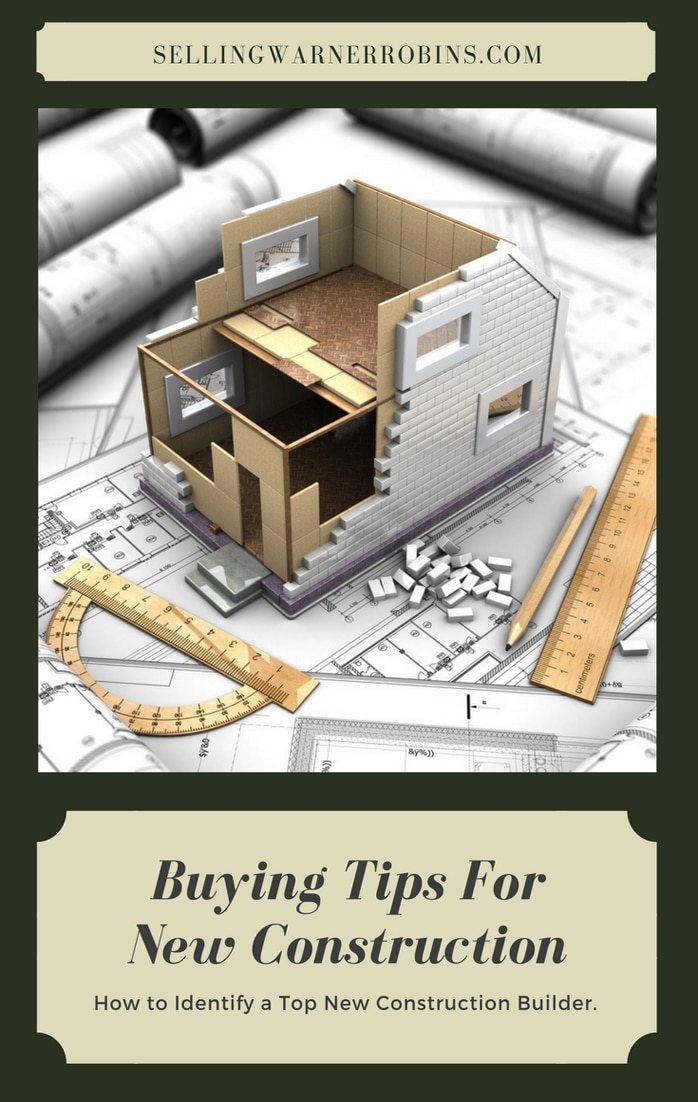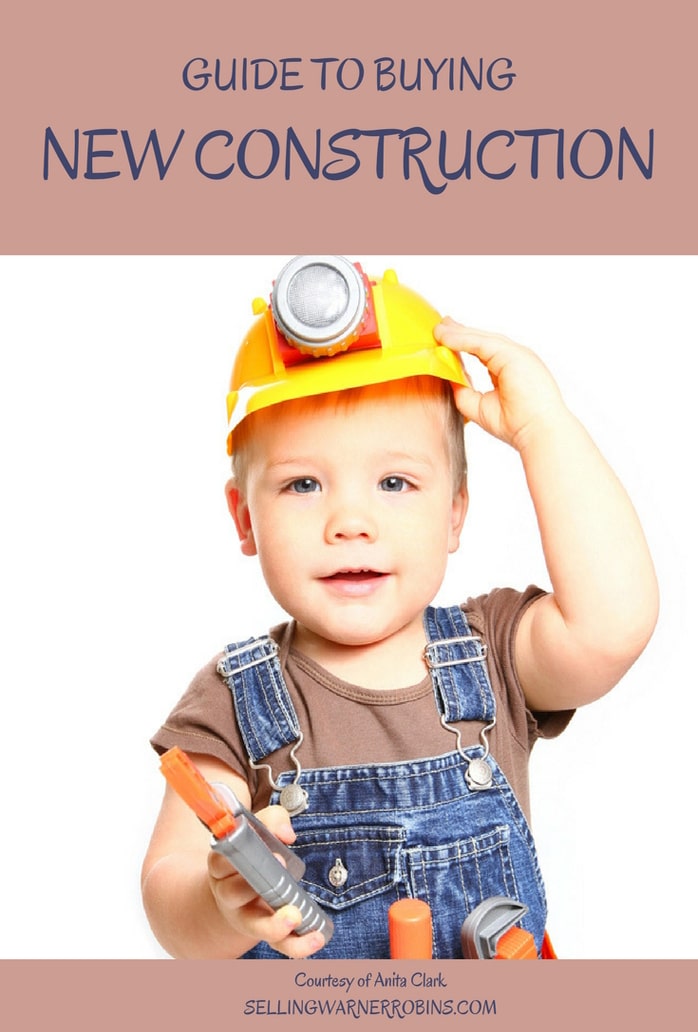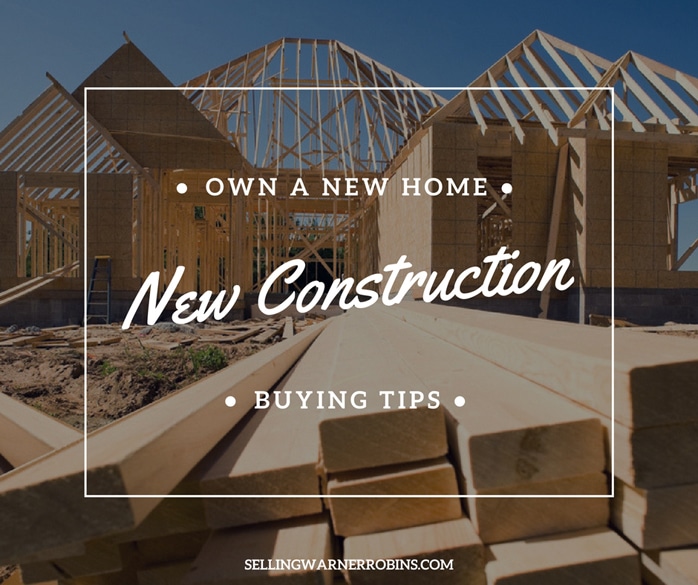What You Should Know About Buying A New Construction Home
Most of the tips for buying a home are directed to people who are purchasing an existing home. However, some buyers do not want to live in a pre-owned home, and they would much rather have a brand new property. This type of purchase comes with its own set of challenges, and the rules that apply to pre-lived homes are not necessarily the same for new construction. If the thought of buying a new construction home intrigues you, read on for more details.
If you are planning to purchase a house that is just built or are building a custom home, there are some steps you need to take to ensure the property you buy works for you and your family. Follow these tips for buying a new construction home to not only make the process as easy as possible but also to ensure you find a quality builder to create your dream home.

How to Identify a Good New Construction Home Builder
Finding a good builder can be a long and drawn-out process, with plenty of scars to bear if not done correctly. Your home is your everything, so you need to be sure that only qualified and professional builders come into contact with it. There are phone books, cork boards and an internet full of builder names, but how do you know if any of them are the right ones for your build?
There is a level of investment you need to make, aside from the obvious financial one, to ensure you find the best builder for your project. That investment is time! Here is how to find a decent builder in your area, signs that they are unethical or ethical, and some extra homework from your side that will not only streamline the build, but also protect your bank account and sanity.
Get Recommendations
There is nothing quite as effective as recommendations from trusted colleagues, friends, or family when you are looking at buying a new construction home. Ask around and the put word out that you are actively looking for local builders. Within a short amount of time you should have some reliable referrals from your sphere of influence.
It is also a good idea to ask someone with a home similar to the style that you would like to build. For example, if you ask someone who has a ranch-style home, but you want a Cape Cod-style home, you might not end up with the home you want.
Builder Websites
When you are looking for your next builder, unification sites can be very helpful. There are two market-leading websites that offer a database of builders alongside recommendations. One of them, MyBuilder, relies on clients to provide searchable feedback about their builder and the workmanship once the project has been completed. Each builder’s rating is determined by how positive their feedback is.
If their website does not indicate how long they have been building homes, ask them directly. It is important to understand their experience, expertise, and whether they will be overseeing the work themselves or subcontracting the entire build to others.
Speak to Other Tradespeople
Capitalize on the local tradespeople community in and around your area. Find out who genuinely commands respect and who has a less stellar reputation. The majority of tradespeople recognize who shares the market with them even if they are in different specializations, and they will be a solid judge of quality of work.
If the builder has a spotty history with other contractors or subcontractors, you should investigate further to establish how the problems originated. If red flags cannot be proved away, you might want to consider having your home built with another builder instead of buying a new construction home from one where red flags are going up.
Avoid Very Low Prices
This is a fairly obvious point in that you do not typically get something for nothing, and where else does quality and workmanship matter more than in the four walls and roof around you?
While an expensive quote for your home does not imply absolute building quality, it is imperative you do not get seduced by low prices. There is supply and demand in building like everywhere else, and if one builder offers you a noticeably different quote than the others, you need to question it and approach with caution.
While they could simply be offering good value for money, they could also guarantee the work by any way possible, to carve out profit for themselves. The last thing you want is for your builder to cut corners or add on extra charges as they go on.
Take a look at other people’s build costs on the builders’ website, if that information is available. This can often lead to disputes as the project continues, or even worse, the builders realize they are not making a profit and pack up mid-job.
Follow up on References
However you have found your builder, whether through associations, recommendations or otherwise, it is imperative you request references of their previous clients. Perhaps you could specify projects they have worked on recently that mirror your planned house design, like high-end luxury projects they have completed in the last six months.
Two or three references will be enough, but do not be afraid to push for more if the referenced projects are vastly different from your idea for your new home. Ask questions that relate to the builder’s timeliness, communication style, and other important factors that can help (or hinder) a new construction project.
Visit Previous Projects
If you are trying to narrow down you list of potential builders, it is time to explore their respective previous projects. These should be available on their website, social media, or you may be able to simply ask the builder where their previous projects are located.
Drive out to homes you know they have built or worked on, ideally on the weekend, and assess the quality of the build and the happiness of the owners. Ask if any problems were rectified and if the owner would buy another home from these builders. If the home is unfinished, or has a different owner than originally intended, you might want to consider why this happened.
With regards to the quality of the home, be sure to look for the standard of the cabinetry, trim work, paint and carpeting or flooring. Remember to keep a notebook to log all the pros or cons at the end of your expeditions. The more detective work you perform, the better able you will be to make an informed decision on which builder will provide exactly what you want.

Talk to Inspectors
How often do you call upon your local authority for help with anything? One of the most underutilized resources are building inspectors. Where better to find advice than from those who are responsible for discerning the quality and standard of new buildings?
While they cannot guarantee a trouble-free builder, they know the industry inside-out within their locality, so they will be able to refer some decent builder firms. If they have been an inspector in the same area for many years, they will have a good idea of who can deliver the home of your dreams.
Trade Associations
Trade associations can be a useful extra vetting process, adding credibility and legitimacy through affiliation to builders. Furthermore, many associations carry out reference checks, physical examinations of past projects, and more. Trade associations are not obligatory for builders to join, therefore there is some competition among them in order to attract the most builders, thus revealing their clear commercial nature.
This does not need to be a bad thing, but it does mean you should do your research on the largest and most reputable associations around. One of the main building trade associations out there is the NAHB (National Association of Home Builders).
Most reputable builders will have a membership, and if the builder you are vetting does not, it is definitely worth reconsidering your project with them. While you might have less upfront costs with a newer builder, or one that is not part of any associations, it is important to consider how that might cost you in terms of repairs down the road.
Warning Signs
Just like there are ways and means to identify a good builder for a new-construction home, there are also signs that a builder may be unethical:
- They are vague about including certain guarantees in the contract in writing.
- A lot of money is requested upfront before they commence on work, even though they do not need to pay workers or suppliers in advance. They may simply be grabbing the majority of the cash while you are still willing because they know their quality of work down the line will not necessarily warrant the amount discussed.
- They pressure you with urgency. If a builder insists they can only offer you a certain deal that is time-limited, walk away.
Positive Signs
There are a lot of excellent contractors out there. Here is a thumbnail description of an ethical and professional builder:
- They qualify every stage and aspect of the work in writing as a way of reassuring the customer they will know what they are getting. This engenders a feeling of integrity in the professional relationship.
- Money is only requested upfront if there are non-returnable items they need to buy for your build. This also implies excellent credit, as they can float your job in the meantime before requesting payment. Money in the bank is a good sign.
- You are not pressured into signing a contract.
Your Extra Homework
Before you go ahead with the search, you need to create your own specifications for the work to be carried out. This means detailing the items you want installed, the installation instructions and the equipment to carry out the work. Essentially, you need to know your project requirements inside-out to ensure that not only the job is done correctly, but also that the warranties for each appliance or installation remain intact.
Furthermore, this type of detailed specification also prevents your builder from coming after you post-job to ask for more money because of time and equipment required. Trust does indeed need to be earned, and if a contractor earns it by adhering to your requirements in the job description, you will most likely use them again or refer them to friends and family.
Finding the right builder can be hard and can take a huge amount of work and time you had not initially considered. However, being methodical, comprehensive, and in-depth in your search for your house builder is a small investment in comparison to the amount of money you are going to be giving to a contractor, not to mention the issues you could be faced with if unethical builders have their way with your house.
Be prepared to go the extra mile and you will no doubt partner with one of the many excellent builders in your area. Once you find the ideal builder for your needs, it is time to get down to business and start the process of buying a new construction home.

Buying Tips for New Construction
Do not get intimidated by the process! With a quality agent by your side, you can not only get everything you want but often at the price you intended too. Just remember to keep your wits, use a little common sense, follow these buying tips for new construction, and you will be well on your way to owning your dream home. It all starts with…
Hire a good agent
Having an agent that represents your best interests is something that needs to be done regardless whether you are buying a pre-lived or just-built home. However, this is especially significant for new construction because these properties are often staffed by agents who have a relationship with the builder.
Your local real estate agent should be experienced in new construction sales so they can provide guidance in everything from structuring your offer to making choices that can affect property resale.
Be wise during negotiations
Unlike the homeowners who are selling their properties, builders are less likely to drop their prices during negotiations, because this can make a precedent for future buyers to expect the similar discount. To get the most for your money, consider asking the builder to perform upgrades with no additional charge or without paying for closing costs. Your real estate agent can help you a lot when it comes to negotiations.
Choose your lender with caution
There is a common misconception that buyers have to use builder’s lender. While builders would prefer that, you are not forced to do it, particularly because the builder’s lender does not feel obligated to get you the best deal you can get. Your own bank can offer more attractive terms and rates, based on your long-term relationship with the institution.
Find a mortgage broker or a banker you feel you can trust, and expect guaranteed fees. You should know that the lender is obligated by law to give you a loan estimate which discloses all the closing costs.
Do not change jobs before your home is completed
If a lender has accepted you the first time, that does not mean he or she cannot refuse you the second time. This often happens because of changed circumstances, such as a new job or loss of a regular paycheck. So, if you were planning on leaving your workplace, be patient. Immediately prior to or during the purchase of a new construction home is not the right time to make that move.
Be skeptical with model homes
Do not rely too much on what you see in a model home, because what you see is not always what you get. Model homes often reflect a mix of standard features and a handful of upgrades, just to showcase what is possible.
Make sure to ask which one is which, so that you know exactly what are you getting and what can you get if you ask. The price quoted at the beginning may change when you ask for some additional features so keep that in mind.
Research the builder
You need to be aware of the uncertainty of today’s economy and the pressure it is putting on construction companies. Some of them may have problems with finances, which is definitely not good for the buyer seeking only the best. Visit the local courthouse to check for liens filed against the builder, and visit the construction site to ask the subcontractors if they are regularly paid.
Reading online reviews of the company could also help, but keep in mind that every builder will have both positive and negative reviews. A good builder will have more of the former. Ask your agent about the builder’s reputation, and visit the occupants of the previously constructed properties to check whether the home fulfilled their expectations in terms of functionality and standing up the test of time.
Check out the neighborhood
One of the things that make new construction different from old properties is that newly-built houses are usually far from the city center in neighborhoods where “everybody knows your name.” Are you willing to live in such a community?
Before you make the final decision, you need to visit the neighborhood where your potential house is being built, speak to the people living there, check the noise levels, crime rate, the proximity of schools, hospitals, parks, and other amenities that are important to you and your family. Ensure you visit during different times of the day as traffic and noise levels may differ depending when you initially go by.

Find out how many properties have been sold
It is not very likely that anyone wants to be the only resident in a new block or to be surrounded by noisy and seemingly never-ending construction site. Ask about the owners-occupants ratio, because being the only permanent homeowner in a neighborhood of transient tenants can be tiresome.
Check for the area’s potential
While the new neighborhood might seem dull and deserted right now, that does not mean it will stay that way. Many builders do not feel obligated to inform you about the city’s plan for the area and the community dynamics regarding neighborhood parcels and traffic planning.
It is up to you and your real estate agent to find out what is on the horizon and to get to know the local homeowners’ association and see what they know. Knowing what is on the way or being planned can have a significant impact on whether you want to consider living in the area.
Get informed about the materials used in construction
Modern home buyers are more educated today than they have ever been. That is why they expect their homes to be, not only functional but also sustainable. In the previous decades, many properties were built with materials that can release toxins into the indoor air and cause health damage. Also, because eco-consciousness was not at such a high level as it is nowadays, construction materials were sourced from unsustainable resources, which produced large amounts of CO2 during the building and throughout the property’s existence.
Some companies still use similar materials and practices, and it is up to you to check is sustainability on your potential builder’s priority list. Some of the revolutionary materials and features that can be used are wool bricks, sustainable concrete, triple-glazed windows, and paper insulation. Another useful addition that could set one builder apart from the other is solar panels which generate power in addition to protecting the building from the elements. This upgrade can bring you additional savings in the future and potentially increase the property value if you decide to sell one day.
Prioritize the upgrades
Not all upgrades are created equal in terms of improving functionality and adding value to the property. Talk to your agent to figure out which additions could bring the highest returns in the case of selling. When you establish your budget, look for properties that are about 20 percent below it, so that you can afford additional features. Some of the things that make great investments are energy-efficient upgrades, additional bathrooms, and even walk-in closets.
Do not sign anything until you are completely sure
Everything that is not negotiated and agreed upon and written into the contract you are meant to sign should be considered non-valid. Verbal agreements are not binding.
This is especially true if you are purchasing a property that is yet to be constructed or finished. In these types of buildings, the contract needs to contain deadlines and penalties for not meeting them. The purchase agreement documents must specify the completion date to avoid additional charges.
Ask for legal advice
While your agent should be able to help you with the majority of the details, if there is something you do not understand you should not hesitate in seeking legal advice. A real estate lawyer will be able to check for mistakes and deceptions in the purchase agreement and ask all the important questions about cancellation rights, your commitments, and liability.
Get an inspection
Home buyers often wrongfully assume that newly built house will not have any defects. But it is not uncommon that even new construction has structural issues, plumbing fixtures that are installed backward, HVAC systems that are too small, or other problems that can affect your future in the house.
Municipal inspections look for code violations and are not as thorough as independent professional inspections, which can find defects in craftsmanship, if there are any, and help you get a warranty for a period after the move-in. You should be present for the inspection and ask everything you want to know. Otherwise you may be buying a new construction home with built in issues from day one and no one wants that!
Know what’s covered by the warranty
So, you have got your home warranty, and now you are happy, but did you check what is covered by it and for how long? Builders usually hire a third-party warranty company, and if certain products like windows or appliances are included, they can be covered by the manufacturer’s warranty, which means the builder has no direct impact on the terms. You need to ask the builder to provide the information on different policies that cover different features of the home.
Buying a new construction home can be very exciting because it provides you many options that are not available when buying homes that have already had occupants. With that being said, this adventure comes with a set of unique challenges you need to be aware of before signing anything. Hopefully, the tips above will guide you through this process safely and make this a positive experience for you.
Additional New Home Construction Resources
Jeff Nelson provides key information for consumers who have new construction questions.
If you found this article on tips for buying a new construction home helpful, please consider sharing this article via social media.
Guide for Buying a New Construction Home
About Anita Clark Realtor
Anita Clark has written 670 posts on this blog.
by Anita Clark Anita is a residential Real Estate Agent in Warner Robins Georgia, with Coldwell Banker Access Realty (478) 953-8595, aiding buyers and sellers with all their real estate questions on her Warner Robins blog.




